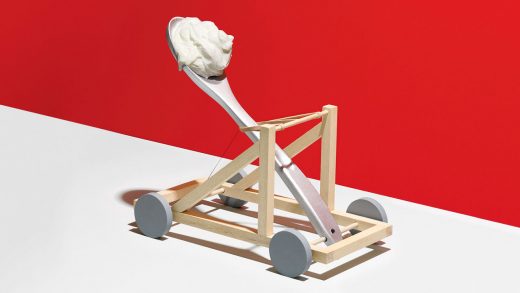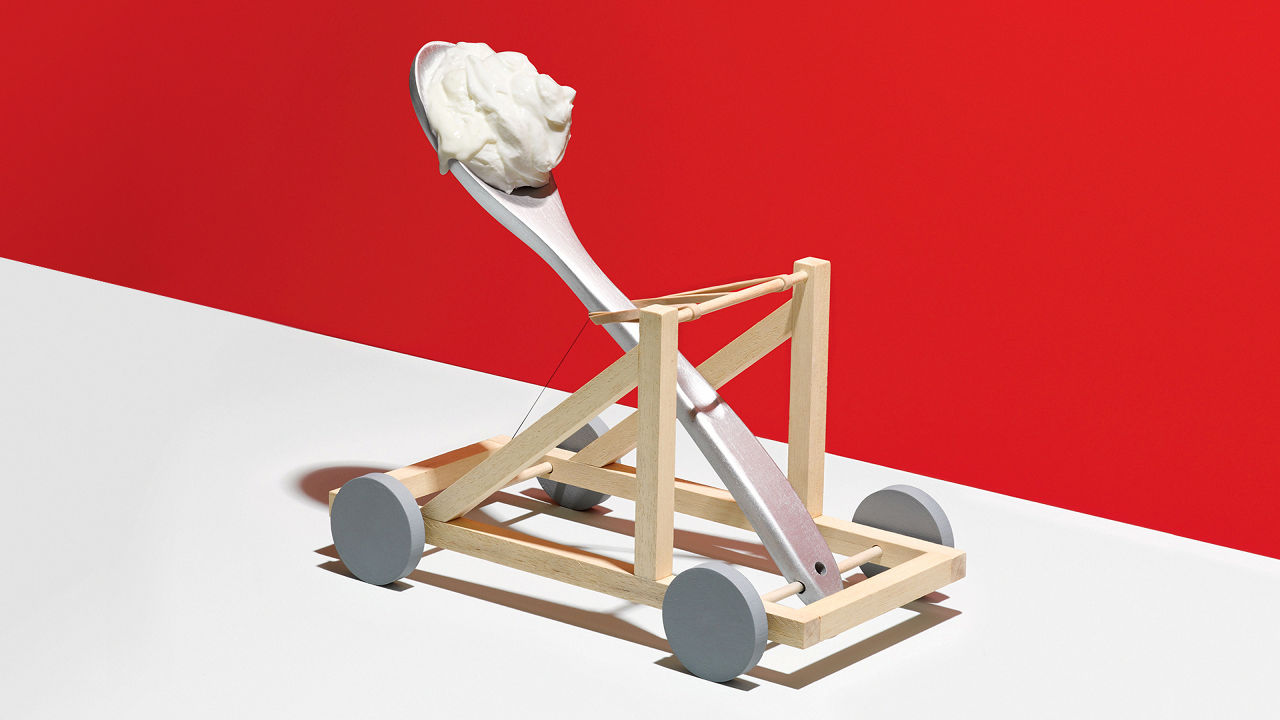Chobani And General Mills Fight To Be The Most Important Meal Of The Day
It’s January 6, 2016, and you’re settling down for breakfast, watching the morning news. “North Korea claims it successfully tested its first hydrogen bomb.” “State of emergency declared in Flint, Michigan, over contaminated drinking water.” A new ad catches your eye. A woman, who looks a lot like you, holds a container of Yoplait Greek 100, reading the label. All of a sudden, she throws the cup away as the voiceover says, “Potassium sorbate? Really? That stuff is used to kill bugs.” The spot, the ad-world equivalent of an H-bomb, now has your full attention. The closer: Chobani’s 100-calorie Greek yogurt has no preservatives.
The Chobani campaign, which included a similar strike against Dannon, succeeded a little too well in rattling its rivals. On January 10, General Mills, which makes Yoplait, sued Chobani to get the ads off the air. “The television commercial that leads the Chobani attack campaign,” states the complaint General Mills filed in federal court, “goes so far as to convey that, because Yoplait Greek 100 is laced with a pesticide, it is so dangerous and unfit to eat that consumers should discard it as garbage.” A judge sided with General Mills, and Chobani stopped airing the spots.
A few months later, though, Chobani’s accompanying #NoBadStuff hashtag is still going strong on Twitter. And Chobani CMO Peter McGuiness, the architect of the campaign, is unapologetic about the dustup in the dairy case. “The market is getting more crowded,” he says, explaining the company’s aggressive messaging. “We decided to get more credit for our craft. We are being louder and prouder.”
Chobani has good reason to defend its turf: The company created it. Nine years ago, when Hamdi Ulukaya founded Chobani, Greek-style yogurt made up only 1% of the market. Today, 50% of all yogurt produced in the United States is Greek, and over the past decade, per capita yogurt consumption has doubled. Chobani is valued at $2.5 billion and controls 16% of what is now a $7.7 billion market. The ongoing fight between Chobani and General Mills showcases the challenges in catering to Americans’ growing desire for healthier choices, with ingredients they can pronounce—without sacrificing convenience or the surprise of new flavors.
General Mills remains committed to appealing to the widest variety of tastes. It offers Dora the Explorer–themed yogurt for kids, indulgent cappuccino-flavored dessert yogurts for sweet tooths, and organic fat-free yogurts for health nuts, under a multitude of brands including Mountain High, Liberté, and Annie’s. “Our brands are at very different places within the category and give us the opportunity to grow,” says Doug Martin, the yogurt brand manager at General Mills. Last year, General Mills also started a VC unit to fund food startups (and give it a pipeline for acquisitions). One notable investment: Good Culture, which aims to do for cottage cheese what Chobani did for yogurt.
General Mills supports its approach with exactly the kind of corporate research that you’d expect from the 87-year-old, $17.6 billion behemoth. It studies what’s missing from the market, then develops yogurts that cater specifically to those needs. General Mills discovered, for instance, that consumers don’t generally feel satiated after eating yogurt, no matter how much protein or fat it contains. “The physiological response of feeling full is triggered by using your molars to chew something,” Martin explains. This led Yoplait to develop Plenti, a new line of Greek yogurt that is chock-full of oats and seeds. (Also: Chobani introduced yogurts with oats and seeds in the fall of 2014.)
By contrast (and perhaps by design), Chobani follows the lead of its founder. “Hamdi never asked the consumer what they liked,” says Kai Sacher, Chobani’s VP of R&D, scoffing at companies that study charts and spreadsheets about consumer behavior. “He believed you need to give them the better option.” Sacher claims that he and his team sit around a kitchen table, dreaming up unique flavor combinations—like sriracha mango and chipotle pineapple—and then find ways to turn them into yogurt products. The company also has a café in New York where it tests out new recipes on customers.
In a world where cereal sales suffer because consumers don’t want to hassle with a spoon and bowl, Chobani intends to be the most convenient option by creating a line of Greek-yogurt beverages, inspired by those served in Ulukaya’s native Turkey. While Americans spoon yogurt, people in Asia, the Middle East, and Eastern Europe mostly sip it. Chobani execs believe these drinks could be its next hit. If it is, Martin and General Mills say they’re ready. “On the fast end, we can turn around a new product in as little as six months,” Martin says. In other words, expect more lip smacking.
A version of this article appeared in the July/August issue of Fast Company magazine.
Fast Company , Read Full Story
(35)



